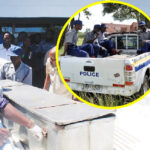The air in Zimbabwe’s political arena is thick with the scent of power struggles, as the succession battle within Zanu PF intensifies. While President Emmerson Mnangagwa has declared his intention to step down in 2028, the whispers of ambition and the jostling for position have already begun.
The youth league, typically a hotbed of political ambition, has been caught in the crossfire. Tinomuda Machakaire, the league’s national secretary, has issued a stern warning to those who dare to discuss the succession, particularly those who have already begun throwing spanners on Vice-President Constantino Chiwenga’s ascendancy to the highest office on land.
“We are coming out of an election only held last year; we don’t want youths who go on social media to talk about the succession of the President,” Machakaire declared at a meeting in Goromonzi. “It is not for our age as the youth to talk about the succession of the President. Let the leadership do that and as for us we are there to support their decisions. If we see you talking about the leadership of the country, you are a lost youth.”
Machakaire’s pronouncements are a clear attempt to quell the growing unrest within the party, which has been fuelled by the perception that Mnangagwa’s announcement of his retirement is nothing more than a ploy to buy time and consolidate his power.
“The constitution allows two terms. An announcement that he will retire will open the contest for succession,” says political analyst Vivid Gwede. “There are growing doubts over Mnangagwa’s sincerity in the statement that he will not run for a third term.”
The youth league’s attempt to silence the succession debate is unlikely to succeed. Chiwenga, the mastermind of the 2017 coup that brought Mnangagwa to power, has long been considered a potential successor. However, his health has been a source of speculation, and the deaths of key allies, such as former foreign affairs minister Sibusiso Moyo and former air chief marshal Perrance Shiri, have left him politically vulnerable.
“There are now doubts that Chiwenga will be the heir apparent because of his ill health,” says Nairobi-based Zimbabwean analyst Tinashe Gumbo. “Chiwenga is exposed as he no longer wields power in military circles.”
The succession battle is further complicated by the recent reshuffle within the Central Intelligence Organisation (CIO), a move seen as a consolidation of power by Mnangagwa. This shake-up, which saw the elevation of individuals loyal to Mnangagwa, has been followed by a similar restructuring in the Zimbabwe Republic Police (ZRP), where numerous senior officers were retired and trusted individuals were promoted.
These changes come amid reports of security breaches at properties linked to Mnangagwa and his close relatives. Incidents include break-ins at Mnangagwa’s house under construction in Borrowdale, a mysterious fire at his son David’s Harare home, and a break-in at the offices of Tourism deputy minister Tongai Mnangagwa.
The succession issue is causing significant tension and mistrust within the government. The recent reshuffles in the CIO and ZRP are clear indications that Mnangagwa is taking no chances as he prepares for the inevitable power struggle that will follow his departure.
Zanu PF spokesperson Christopher Mutsvangwa has attempted to quell the growing anxieties by stating that the party’s new leader will be chosen in an open contest. However, the recent events suggest that the succession battle will be anything but fair.
The youth league’s attempt to silence the debate is a futile exercise. The succession battle is already in full swing, and the stakes are high.












